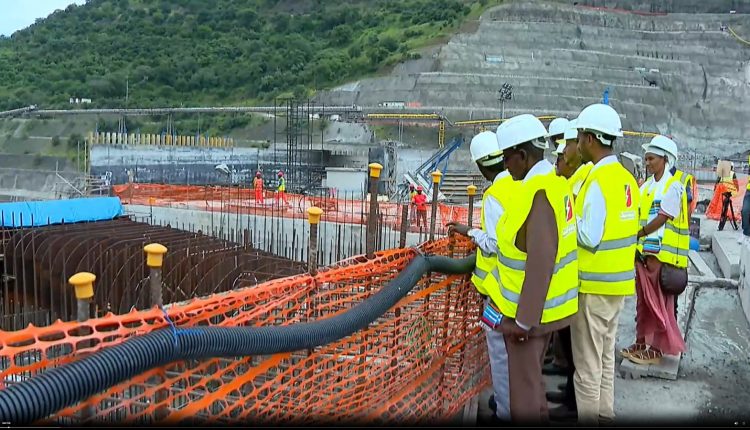Ethiopia’s political parties pledge unity on national interests, applaud development projects
Addis Ababa, June 21, 2025 (FMC) — Ethiopia’s political parties have pledged to work together in advancing national interests and improving the lives of citizens, setting aside partisan differences in a renewed spirit of unity and development.
The commitment was reaffirmed during a joint visit to major national projects, where party leaders emphasized that such collaboration is vital for fostering national unity, promoting shared development, and sustaining peace in the post-reform era.
The leaders made the remarks during a visit to the Koysha Hydroelectric Dam Project, a flagship development underway on the Omo River. They hailed the project as a monumental national investment and a symbol of collective ambition that will serve generations to come.
Impressed by the scale and pace of progress, the visiting delegation described the Koysha Dam as a testament to what Ethiopia can accomplish when united around a shared vision. They stressed that effective utilization of the country’s abundant resources holds the key to rapid, transformative development.
The political representatives also reaffirmed their commitment to support ongoing national development initiatives across key sectors.
Once completed, the Koysha Hydropower Project is expected to generate 1,800 megawatts of electricity, making it Ethiopia’s second-largest power-producing facility after the Grand Ethiopian Renaissance Dam (GERD). The 2.5-billion-euro project straddles Konta Koysha Woreda in the Konta Zone of the Southwestern Ethiopian People’s Region and Melo Koza Woreda in the Gofa Zone of the South Ethiopia Region. Project coordinators reported that the dam has reached 65 percent completion.
Beyond electricity generation, the project’s design incorporates components that address local social and economic challenges, promote environmental sustainability, and unlock the area’s tourism potential.
During their visit, the political party leaders also toured Halala Kela Resort and the Gibe III Hydropower Project. Halala Kela Eco-Lodge, in particular, was praised as an international-standard tourism destination that harmonizes historical heritage with modern architecture.
Speaking on the occasion, Ashebir Tadesse, Head of the Democratic Culture Building and Electoral Affairs Bureau at the Prosperity Party Headquarters, noted that the national reform process has fostered a new political climate conducive to collaboration among political parties. He lauded the quality and efficiency of major development projects like Halala Kela, calling them engines of economic growth that preserve cultural heritage while embracing modernity.
Dawro Zone Chief Administrator Dawit Gebeyehu highlighted that Halala Kela, developed under the initiative of Prime Minister Abiy Ahmed, has revealed the hidden history of the region and is positioning itself as a major tourism hub. He added that the resort is creating local employment opportunities and revitalizing the zone’s tourism economy.
Geleta Hailu, Head of the Democratic Culture Building Sector for the Prosperity Party’s Benishangul-Gumuz Region Branch, described the resort as a model for tourism-driven development that could be replicated in other regions.
Afar Liberation Front Party Deputy Chairman Haji Ismael Mohammed emphasized the transformative impact of Ethiopia’s large-scale infrastructure projects on national economic growth.
Tegabu Dejene, Deputy Chairman of the Youth Wing of the Joint Council of Political Parties and Head of the Youth Wing of the Wolaita National Movement, praised Halala Kela as an exceptional tourism site that successfully blends tradition and contemporary design. He highlighted its contribution to the expansion of tourism and service sectors in southern Ethiopia.
Gatbel Bol, Deputy Head of the Ezema Party in the Gambella Region, also underscored the potential of Halala Kela to accelerate tourism development in the region, ENA reported on Friday.
The political leaders concluded their visit by highlighting the importance of their recent engagement with Prime Minister Abiy Ahmed. They described the discussion as instrumental in building national unity, sustaining peace, and fostering inclusive development. Such engagements, they said, are vital to nurturing Ethiopia’s evolving democratic culture—one rooted in peaceful political competition and national solidarity.

